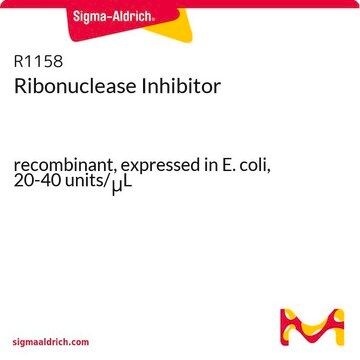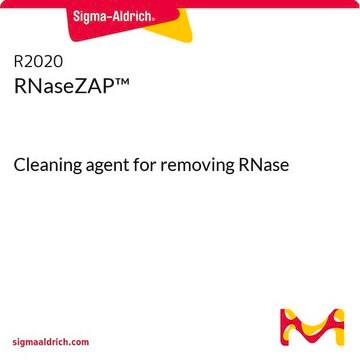556881
Ribonuclease Inhibitor, Human, Recombinant, E. coli
The Ribonuclease Inhibitor, Human, Recombinant, E. coli controls the biological activity of Ribonuclease. This small molecule/inhibitor is primarily used for Protease Inhibitors applications.
Iniciar sesiónpara Ver la Fijación de precios por contrato y de la organización
About This Item
UNSPSC Code:
12352200
Productos recomendados
Quality Level
form
liquid
specific activity
≥20,000 units/mL
manufacturer/tradename
Calbiochem®
storage condition
OK to freeze
foreign activity
Endonuclease and RNase, none detected
shipped in
wet ice
storage temp.
−20°C
General description
Recombinant, human ribonuclease inhibitor expressed in E. coli. Non-competitive inhibitor that inactivates RNase by non-covalent binding. Has been used to improve cDNA synthesis and in vitro RNA synthesis, increase yields of polysomes and aid in the preparation of RNase-free antibodies. Inhibits RNases A, B, and C. Does not inhibit RNase T1 and S1 nuclease from Aspergillus.
Recombinant, human ribonuclease inhibitor expressed in E. coli. Non-competitive inhibitor that inactivates RNase by non-covalent binding. Has been used to improve cDNA synthesis and in vitro RNA synthesis, increase yields of polysomes, and aid in the preparation of RNase-free antibodies. Inhibits RNases A, B, and C. Does not inhibit RNase T1 and S1 nuclease from Aspergillus.
Biochem/physiol Actions
Cell permeable: no
Primary Target
inactivates RNase
inactivates RNase
Product does not compete with ATP.
Reversible: no
Warning
Toxicity: Standard Handling (A)
Unit Definition
One unit is defined as the amount of material that will inhibit 50% of the activity of 5 ng of RNase A.
Physical form
In 50 mM KCl, 20 mM HEPES, 8 mM DTT, 50% glycerol.
Reconstitution
Maintain at -20°C. Avoid freezing solutions. Addition of DTT is recommended to maintain 8 mM level.
Other Notes
Saxena, S.K., et al. 1992. J. Biol. Chem. 267, 21982.
Lee, F.S., et al. 1989. Biochemistry 28, 225.
Lee, F.S., et al. 1989. Biochemistry 28, 225.
Legal Information
CALBIOCHEM is a registered trademark of Merck KGaA, Darmstadt, Germany
Storage Class
12 - Non Combustible Liquids
wgk_germany
WGK 1
flash_point_f
Not applicable
flash_point_c
Not applicable
Certificados de análisis (COA)
Busque Certificados de análisis (COA) introduciendo el número de lote del producto. Los números de lote se encuentran en la etiqueta del producto después de las palabras «Lot» o «Batch»
¿Ya tiene este producto?
Encuentre la documentación para los productos que ha comprado recientemente en la Biblioteca de documentos.
Vera Thole et al.
BMC genomics, 20(1), 995-995 (2019-12-21)
Flavonoids are produced in all flowering plants in a wide range of tissues including in berry fruits. These compounds are of considerable interest for their biological activities, health benefits and potential pharmacological applications. However, transcriptomic and genomic resources for wild
Nida Ali et al.
Nucleic acids research, 48(2), 847-861 (2019-12-06)
RNase E is a 472-kDa homo-tetrameric essential endoribonuclease involved in RNA processing and turnover in Escherichia coli. In its N-terminal half (NTH) is the catalytic active site, as also a substrate 5'-sensor pocket that renders enzyme activity maximal on 5'-monophosphorylated
Asimina Katsiani et al.
The Journal of general virology, 101(6), 676-684 (2020-05-08)
Rose rosette virus (RRV) (genus Emaravirus) is the causal agent of the homonymous disease, the most destructive malady of roses in the USA. Although the importance of the disease is recognized, little sequence information and no full genomes are available
Ihshan Akthar et al.
Reproduction (Cambridge, England) (2019-12-04)
We previously reported that sperm binding to cultured monolayers of bovine uterine epithelial cells induces an acute inflammatory response involving the Toll-like receptor (TLR2) signaling pathway. This response serves to clear the uterus of sperm and thereby prepares the endometrium
Claudia S Barros et al.
STAR protocols, 3(4), 101735-101735 (2022-10-02)
Here, we describe a protocol to remove single identified cells directly from Drosophila living brains and analyze their transcriptome. We detail the steps to harvest fluorescent cells using a capillary under epifluorescence and transmitted light to avoid contamination. We then
Nuestro equipo de científicos tiene experiencia en todas las áreas de investigación: Ciencias de la vida, Ciencia de los materiales, Síntesis química, Cromatografía, Analítica y muchas otras.
Póngase en contacto con el Servicio técnico







